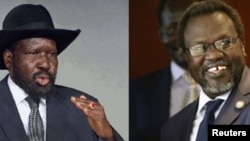South Sudanese President Salva Kiir arrived in the Ethiopian capital Monday for talks with rebel leader Riek Machar, just days before a deadline for the two men to reach a final peace deal for their country.
Seyoum Mesfin, the lead mediator at the talks, said the two men are expected to hold face-to-face talks as early as Tuesday. Seyoum said, "They will be asked to discuss three issues: the structure of the government, particularly the top level... the power-sharing ratios in the cabinet and the National Assembly... and the status of forces -- do they want one army during the transition, two armies and so on."
Under the terms of a power-sharing proposal drafted by the talks' organizers, the Intergovernmental Authority on Development (IGAD), Mr. Kiir and Machar have until Thursday to reach a final peace deal. The international community has threatened to impose more sanctions on South Sudanese leaders if the peace deal falls through.
To date, the two sides have failed to see eye-to-eye on many of the key issues highlighted by Seyoum, including how to share power during a 30-month transitional period. IGAD says in the power-sharing proposal -- which was signed by Mr. Kiir and Machar early last month -- the transitional government should be in place as of July 9.
Last chance
What Seyoum has called the last-chance peace talks for South Sudan began last week, but Mr. Kiir was absent from the talks until today. Delegates for the warring sides spent the first week of the talks meeting at a committee level to try to iron out lingering differences.
The two sides disagree on many of the issues outlined by Seyoum, including the structure of the armed forces, how to share South Sudan’s wealth, and how to share power in the transitional government. The rebels say they want the same number of positions in government institutions as Mr. Kiir’s side will have.
''If the other political parties are going to take 10 percent, then the warring parties must share the 90 -- 45/45 percent,'' said Dhieu Mathok Diing, the chief negotiator for the rebels.
But Makuei said the government will sign a final peace deal with the rebels, regardless of whether the two sides have agreed on all the issues before them.
"There could be hiccups, there could be ups and downs, but, nevertheless, we are optimistic that peace is still within our reach," Makuei said.
If a peace deal is signed in Addis this week, the hope is that it will finally bring nearly 15 months of violence in South Sudan to an end and allow people to start rebuilding their lives.
But this would not be the first peace agreement for South Sudan. The others were breached almost as soon as they were signed, and the fighting, which has been centered mainly in Jonglei, Upper Nile and Unity states, has worn on, claiming tens of thousands of lives, displacing nearly two million people, interrupting children’s education, and dramatically slowing development in South Sudan.










